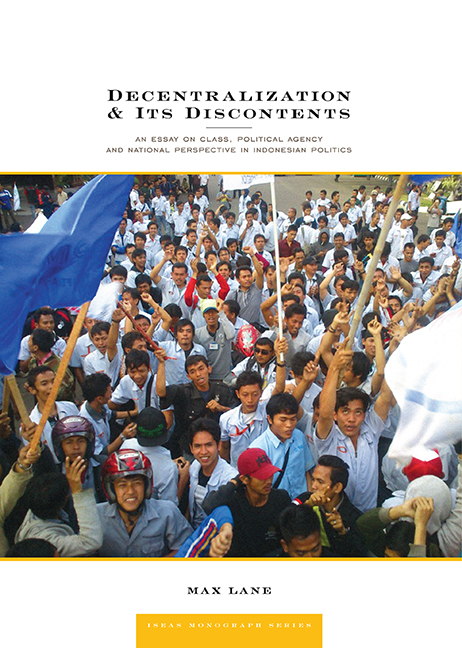 Decentralization and Its Discontents
Decentralization and Its Discontents Book contents
- Frontmatter
- Contents
- Editorial Note
- Preface
- About the Author
- Introduction
- I The Enigmatic Emergence of Decentralization
- II The Political Economy of Desentralisasi
- III Decentralization: Its Discontents
- IV National Agency in a “Co-ordinative State”: The Future of Decentralization
- Conclusion
- Endnotes
- References
Preface
Published online by Cambridge University Press: 21 October 2015
- Frontmatter
- Contents
- Editorial Note
- Preface
- About the Author
- Introduction
- I The Enigmatic Emergence of Decentralization
- II The Political Economy of Desentralisasi
- III Decentralization: Its Discontents
- IV National Agency in a “Co-ordinative State”: The Future of Decentralization
- Conclusion
- Endnotes
- References
Summary
This extended essay was written in late 2013 and early 2014, before the April 2014 election campaigns. One of the first lines written was: “There is a certain Jokowimania afoot”. The March announcement by Megawati Sukarnoputri that the Indonesian Democratic Party of Struggle (PDI-P) would nominate Joko Widodo as its presidential candidate has accentuated this. Media coverage — including the social media — has narrowed down the formal political struggle for governmental power as one between Widodo, the kabupaten (district) capitalist, and Prabowo Subianto, representing the billionaire Djojohadikusumo family. At a certain level, it is a fight between kabupaten capitalism and crony capitalism, although there is no doubt much more behind this.
The emergence of a kabupaten capitalist as a presidential candidate, without doubt, has been possible as a direct result of the last ten years of decentralization, especially providing guaranteed funds over which local government can exercise some autonomy, giving local mayors and bupati greater room to nuance and market the implementation of policies as their own (when in fact such policies originated with international financial institutions working through the national government). The institution of direct elections for mayors and bupati has accentuated this trend. In decentralized Indonesia, Widodo has gone from head of the local businessmen's association, to mayor of a medium-sized town in Java, to governor of the province of Jakarta, and now, to being a presidential candidate of the Republic of Indonesia. He has done this through the PDI-P in a period when the PDI-P no longer has an obvious presence of big capitalists and former cronies in its ranks. The PDI-P is more perceived as being associated with other “rising stars” in regional politics, such as the mayor of Surabaya, “Ibu Risma” (Tri Rismaharini) and the governor of Central Java, Ganjar Pranowo.
Writing this preface before the 9 April 2014 elections, it is tempting to predict results. While it is likely that Widodo's candidacy will increase the vote for the PDI-P, at least a little, it remains the case that it is unlikely that there will be any one party or serious coalition of parties, which will be able to claim that it represents a majority of the population.
- Type
- Chapter
- Information
- Decentralization and Its DiscontentsAn Essay on Class, Political Agency and National Perspective in Indonesian Politics, pp. vii - ixPublisher: ISEAS–Yusof Ishak InstitutePrint publication year: 2014
